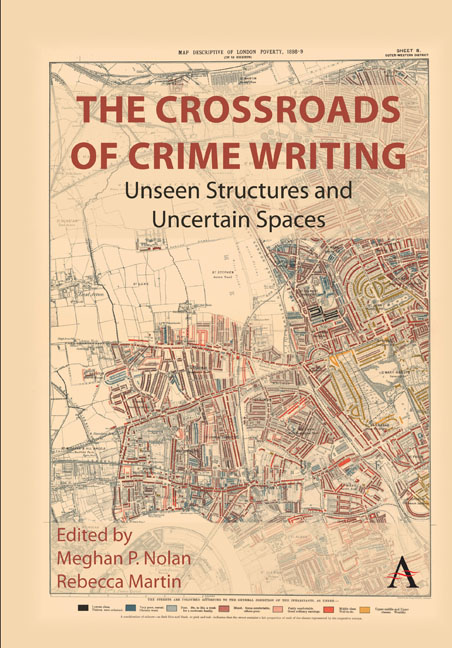Book contents
- Frontmatter
- Contents
- Introduction
- Unseen Structures
- Chapter 1 Unseen Structures and the Outlaw: Depictions of Violations in Stieg Larsson’s Millennium Trilogy
- Chapter 2 Dark Waters: Eco-Noir in New York 2140
- Chapter 3 Between Lenin and Sherlock Holmes: Soviet Militsiya Procedural in Volodymyr Kashin’s Detective Fiction
- Chapter 4 Detecting Justice: Black Crime Fiction and the Novels of Attica Locke
- Chapter 5 The Police and the Private Eye: The Making of Gendered and Racial Peripheralization in the Crime Fiction of Valerie Wilson Wesley
- Uncertain Spaces
- Chapter 6 Navigating the Carceral City: Calcutta in Late Nineteenth-Century Narratives of Detection
- Chapter 7 Traversing the Borders of Poverty and Morality: The Intersection of Maps and Upper-Class Ethics in Anne Perry’s Neo-Victorian Series
- Chapter 8 Facts and Fictions: The Liminal Space Between True Crime and Crime Fiction
- Chapter 9 The Success(Ion) and Corruption of Crime Genres in Jo Nesbø’s Macbeth (2018)
- Chapter 10 The Golden Age Meets the Age of Aquarius: Agatha Christie in the 1960s
- Notes on Editors and Contributors
- Permissions
- Index
Chapter 5 - The Police and the Private Eye: The Making of Gendered and Racial Peripheralization in the Crime Fiction of Valerie Wilson Wesley
Published online by Cambridge University Press: 13 April 2024
- Frontmatter
- Contents
- Introduction
- Unseen Structures
- Chapter 1 Unseen Structures and the Outlaw: Depictions of Violations in Stieg Larsson’s Millennium Trilogy
- Chapter 2 Dark Waters: Eco-Noir in New York 2140
- Chapter 3 Between Lenin and Sherlock Holmes: Soviet Militsiya Procedural in Volodymyr Kashin’s Detective Fiction
- Chapter 4 Detecting Justice: Black Crime Fiction and the Novels of Attica Locke
- Chapter 5 The Police and the Private Eye: The Making of Gendered and Racial Peripheralization in the Crime Fiction of Valerie Wilson Wesley
- Uncertain Spaces
- Chapter 6 Navigating the Carceral City: Calcutta in Late Nineteenth-Century Narratives of Detection
- Chapter 7 Traversing the Borders of Poverty and Morality: The Intersection of Maps and Upper-Class Ethics in Anne Perry’s Neo-Victorian Series
- Chapter 8 Facts and Fictions: The Liminal Space Between True Crime and Crime Fiction
- Chapter 9 The Success(Ion) and Corruption of Crime Genres in Jo Nesbø’s Macbeth (2018)
- Chapter 10 The Golden Age Meets the Age of Aquarius: Agatha Christie in the 1960s
- Notes on Editors and Contributors
- Permissions
- Index
Summary
Introduction
With When Death Comes Stealing, African American writer Valerie Wilson Wesley introduced her protagonist Tamara Hayle in 1994 and has since penned eight novels featuring the character. A single mother, Hayle is a Black woman, who used to work as a cop with the Belvington Heights police department,1 a space dominated by White men, but owing to her teenage son Jamal's racial victimization by her coworkers, she resigns from her job and during the course of the novels runs a private investigation firm, Hayle Investigative Services, Inc. Primarily set in Newark (except for her third novel, Where Evil Sleeps (1996), which is set in Jamaica), the novels are narrated in the first person, and are written from the perspective of a Black woman2 (Soitos 1996, 234), and Hayle examines the lives of African Americans in Newark, New Jersey, in the way Walter Mosley's Easy Rawlins examines African American lives in Los Angeles. As such, Wesley's novels provide readers with what Astrid Erll refers to as “both a first- and a second-order observation” which gives “us the illusion of glimpsing [a] past” (in this case experiential), while simultaneously reflecting upon the “very processes of representation” (2008, 391). This is evident, as Hayle is proud of her city and its cultural heritage and, as critic John Gruesser has argued, both Hayle and the city of Newark are “overlooked and underestimated” by the dominant White males, and yet they survive. Hence, Hayle can be viewed as a symbol for the city (Gruesser 2005a, 89). Additionally, the novels contribute to the cultural memory of a traumatic past (c.f. Erll 2012, 239) as they capture the aftermath of the racial riots of 1967, which shaped the current sociopolitical reality of the city of Newark, and primarily deal with Hayle's lived experience as she tries to professionally confront the world of crime while forging a decent life for herself and her son.
Secondary readings reveal a little more about Wesley and her literary creation. For instance, about the characterization of Hayle, in an interview with John Gruesser, Wesley herself states, “I wanted to create a character who was a very empowered, very smart, savvy professional private detective” (Gruesser 2005b, 171).
- Type
- Chapter
- Information
- The Crossroads of Crime WritingUnseen Structures and Uncertain Spaces, pp. 103 - 124Publisher: Anthem PressPrint publication year: 2024



